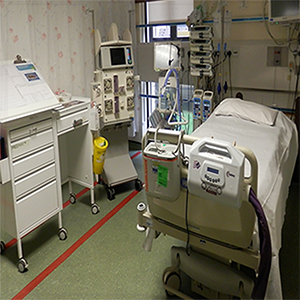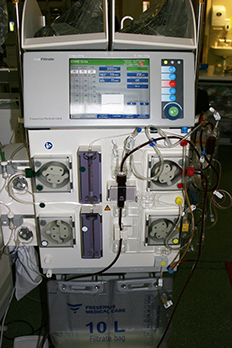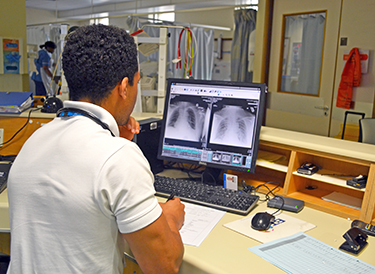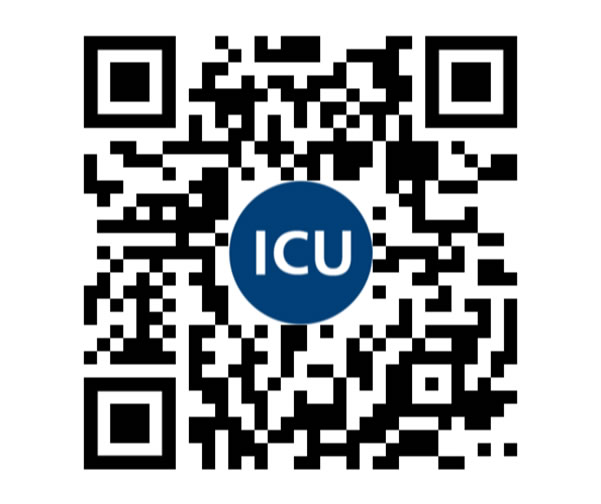Critical Care Unit: ICU and HDU |
B12
|
Treatments on Critical Care
Treatments on Critical Care
Treatment on the Critical Care Unit
A patient is admitted to Critical Care if they are seriously ill and if one or more of their organs requires special treatment or support. We care for patients of all ages (from a few weeks of age and with no upper age limit) and a whole variety of medical and surgical conditions. It allows for more intense observation and monitoring as well as some treatments which cannot be given on a standard hospital ward: we treat the sickest 2% of patients in the RUH.

Patients are only admitted to the Critical Care unit if they have a high risk of death, but despite this, 82% of our patients survive. In fact, our survival statistics are better than the rest of the UK, with an extra 20 patients surviving critical illness every year because they were admitted to the RUH Critical Care Unit rather than an average critical care unit in the UK.
The RUH Critical Care Team comprises specialist doctors, nurses, therapists and support staff. In addition, we liaise closely with doctors and nurses in other specialty teams within the hospital.
Monitoring & devices
Medications
 All patients receive a number of medications,often by drip or continuous infusion delivered by a pump into a vein. These medications are selected carefully to give the best treatment for each patient’s medical conditions. Our Unit has a dedicated pharmacist with whom we work closely to advise on and monitor all medications administered to our patients. Many patients will be given sedatives and painkillers to ensure that they are calm and relaxed. As a result of these medications and also as a feature of many forms of illness, they may well be asleep and be unable to communicate with you.
All patients receive a number of medications,often by drip or continuous infusion delivered by a pump into a vein. These medications are selected carefully to give the best treatment for each patient’s medical conditions. Our Unit has a dedicated pharmacist with whom we work closely to advise on and monitor all medications administered to our patients. Many patients will be given sedatives and painkillers to ensure that they are calm and relaxed. As a result of these medications and also as a feature of many forms of illness, they may well be asleep and be unable to communicate with you.
Breathing
 We need to put some of our patients onto a ventilator (sometimes known as a ‘life support machine’) to assist with or take over their breathing. There are many reasons for this; for example, because the patient has become too exhausted to breathe effectively or in order to rest their lungs which have been affected by disease. This generally involves a breathing tube being placed under general anaesthetic (i.e. ‘asleep’) into the windpipe and connected to the ventilator. Most patients need sedative medications to ensure that they are relaxed (often asleep) and not distressed by the breathing tube.
We need to put some of our patients onto a ventilator (sometimes known as a ‘life support machine’) to assist with or take over their breathing. There are many reasons for this; for example, because the patient has become too exhausted to breathe effectively or in order to rest their lungs which have been affected by disease. This generally involves a breathing tube being placed under general anaesthetic (i.e. ‘asleep’) into the windpipe and connected to the ventilator. Most patients need sedative medications to ensure that they are relaxed (often asleep) and not distressed by the breathing tube.
Certain patients may need a tracheostomy tube to be placed in the front of their throat, as an alternative to the breathing tube: the ICU doctors would explain the reasons and the details of this process to you, were this to become necessary.
As a patient’s condition improves and they become stronger, their own breathing becomes more effective and the support from the ventilator can be reduced; a process known as ‘weaning’. Depending on many factors, including the severity and duration of illness, this process can often take days or even weeks to complete, before the breathing tube can finally be removed.
For some patients with breathing difficulties, they can benefit from a lower level of support (such as CPAP or non-invasive ventilation), using a ventilator device connected either to a tight-fitting face mask or some prongs placed into the nostrils. Patients usually find these quite comfortable and these methods can be very effective in helping their own breathing.
Heart & circulation
We monitor the heart and circulation very carefully and have various investigations and tests available when required. We work closely with our cardiology consultant colleagues and with the RUH Coronary Care Unit. Commonly, in patients who are critically ill, blood pressure can become abnormally low and so their circulation may need to be supported using an infusion of a powerful medication.
Kidneys
 In critically ill patients, it is common for the kidneys to suffer harm and to work less effectively. So some patients require ‘renal replacement therapy’; the use of a machine to filter the blood and replace important chemicals in the blood, while their own kidneys are recovering. This is achieved through a large ‘line’ usually placed into a blood vessel in the neck or groin. This machine may run continuously for many days at a time.
In critically ill patients, it is common for the kidneys to suffer harm and to work less effectively. So some patients require ‘renal replacement therapy’; the use of a machine to filter the blood and replace important chemicals in the blood, while their own kidneys are recovering. This is achieved through a large ‘line’ usually placed into a blood vessel in the neck or groin. This machine may run continuously for many days at a time.
Infections & Sepsis
For many of our patients, an infection (such as a pneumonia, meningitis or urine infection) is the very reason they are unwell and need our care. The body’s response to an infection (known as ‘sepsis’) is one reason that organs can fail and need the supportive treatments mentioned above.
Infections are treated with specific drugs (such as antibiotics or antifungals) and we carry out regular tests to identify the organisms causing each infection so that precisely the right medication can be selected in each case.
In patients who are critically unwell, so whose own immunity is reduced, it is common to acquire a new infection during their illness. Our procedures and practices are designed to minimise this risk and we ask you to please assist us in this aim, by using the hand gel on arrival and when leaving and following other ‘infection control’ instructions given to you by your loved one’s nurse.
Physiotherapy
Physiotherapists are present each day on the Critical Care Unit. They have the responsibility for providing respiratory care (also known as chest care) and are central to the rehabilitation of patients.

Chest care is often focused on clearing the lungs of secretion and helping to improve the breathing of the patient. It is especially important for patients with a chest infection or who are on a ventilator for a long period of time.
Rehabilitation comes in all forms - from stretching muscles for those patients that are unable to move to helping awake patients to take part in day to day activities such as washing, dressing, getting dressed into regular clothes, eating and drinking and getting out of bed. It can mean taking patients outside for a change of scenery or enabling them to watch TV, use an iPad, computer or phone. Getting the right balance between activity and sleep is essential and overcoming any distress due to being in the Critical Care environment is an equally important part of rehabilitation.
The Physiotherapists work closely with all other members of the Critical Care team and also with the family and friends of patients.
Do not hesitate to ask the physiotherapists if you want to take part in your loved one’s care – it may be that there are personal items you can bring into hospital to help make their stay more comfortable or exercises that you can help them to complete.
CCM/004 : Hallucinations leaflet
CCM/002 : Equipment and procedures leaflet
Further information
For further information on some of the procedures we perform on ICU, you may find some of these short videos helpful , you can also scan the QR code below:


